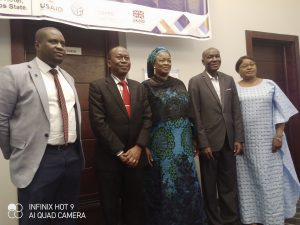
The Independent National Electoral Commission (INEC) says it does not want women to be mere aspirants in the build up to the 2023 general elections but candidates and winners of elective positions.
Prof. Kunle Ajayi, INEC National Commissioner and Chairman, Outreach and Partnership Committee made this remark at the opening ceremony of a three-day Updated INEC Gender Policy Implementation Planning Workshop /Disaggregated Data Collection Tools Training for Gender Desk Officers in Lagos.
Ajayi, who noted that the workshop was part of INEC’s efforts toward achieving inclusivity in the electoral system and governance, said that women electoral population should not restrict themselves to singing and dancing for male politicians.
“Women are critical stakeholders anytime you are talking of majority, which democracy represents.
“We need to bring them into the mainstream because all over the world, they are being marginalised and sidelined and not totally brought onboard.
“We don’t want women to be mere singers and dancers in elections. We want to bring women into the mainstream of decision making.
“We want to make women active participants in the Nigerian democratic process and we have started doing this by creating gender department and inclusivity,” he said.
Ajayi, who noted that the commission recently held a meeting with women where no fewer than 10 women presidential aspirants attended, said that if women were not involved in politics, the nation’s democracy would not develop.
“We don’t want women as aspirants alone, we want them as candidates contesting elective positions and winning same.
“Women are in majority, how can somebody in minority beat them? So, we want them to be conscious of their electoral strength,” Ajayi said.
He said INEC had a week ago, launched its gender policy, hence the need to educate INEC gender desk officers on the policy and how to implement the policy.
Ajayi said the commission had been demonstrating gender inclusiveness in its staff composition to guide political parties on the policy.
He said that INEC had identified various barriers to gender mainstreaming and was addressing them.
“Women are also problem to themselves. Women must join hands together and support each other to emancipate themselves.
“They must be ready also to come onboard,” he added.
According to him, at the end of the workshop, all the INEC gender desk officers across the 36 states and the Federal Capital Territory are expected to be fully equipped with the updated gender policy and be able to carry it out in their domain.
Speaking, Ms Dorothy Bello, INEC Acting Director, Gender and Inclusivity said that the reviewed INEC Gender Policy in the Strategic Planning for 2022-2026, was to consolidate on free, fair, credible and inclusive election.
Bello said the commission carried out a comprehensive review in the policy in 2021 to identify its strengths and weaknesses in implementing gender equity and more inclusive electoral process.
She said the outcome of the review process informed the establishment of a new department on gender and inclusivity with the task of creating awareness on gender sensitivity and equity.
Also, INEC Resident Electoral Commissioner in Lagos, Mr Olusegun Agbaje, said the commission was very passionate about inclusiveness in the electoral process and would stop at nothing to achieving it.
Agbaje, who was represented by Mr James Popoola, the INEC Administrative Secretary in Lagos, said that women participation in election was essential in every democratic set up.
According to him, democracy cannot have its full meaning unless every group is actively involved in the political space.
In his remarks, Mr Ukeh Obaje, the Deputy Country Director for the International Foundation for Electoral Systems Nigeria (IFES) commended INEC’s continuous commitment to the gender mission and mainstreaming.
Obaje said :”IFES as a leading election technical organisation recognises the importance of inclusion in elections and more especially, increasing participation in the electoral processes.
“One of the test of any electoral process in democracy in particular is the participation of the marginalised groups as well as the mechanism that allow for these groups to participate and increase their engagement.
“INEC gender policy provides for such mechanism for accountability and advocacy for the commission and Nigerian women to engage these stakeholders for improved participation in the electoral process.” (NAN)



